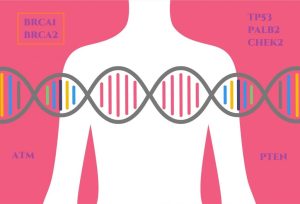
Hereditary Breast Cancer: What You Need to Know
What is hereditary breast cancer?
The hereditary breast cancer concerns cases where a woman (or even a man) inherits pathological mutations in specific genes that significantly increase the risk of developing cancer in the breast, ovaries, and in some cases in other organs, such as the pancreas or prostate.
The most important genes involved are: BRCA1 and BRCA2, which are related to the Hereditary Breast Cancer Syndrome and Ovaries. Carriers of these mutations have a much higher risk of disease than the general population. There are also other, less common, mutations in genes such as TP53, PALB2, CHEK2, ATM, and PTEN, which are linked to specific hereditary cancer syndromes.
What are the chances of developing cancer?
Women who carry a mutation in BRCA1 gene have:
- 50-85% chance of developing breast cancer by age 70
- 40-60% chance of ovarian cancer by age 85
- 25-30% chance of a second primary breast cancer within 10 years of the first
- More frequent occurrence of triple negative breast cancer, more aggressive and difficult to treat
Accordingly, the bodies BRCA2 have:
- 50-85% breast cancer incidence up to 70
- 15-30% chance for ovarian cancer
- Increased risk for pancreatic cancer, melanoma, and (in men) prostate or breast cancer
Who is at higher risk?
A strong family history of breast or ovarian cancer increases the likelihood of carrying a hereditary mutation, though it doesn’t guarantee it. Genetic predisposition is more likely when:
- Multiple family members have had cancer
- Close relatives (first or second degree) were diagnosed at a young age
- There is a history of cancer in male relatives (e.g., male breast or prostate cancer)
How can I find out if I am a carrier?
Evaluation is performed by a geneticist or your doctor using risk assessment tools and family history analysis. If there is a high likelihood, genetic testing for BRCA and related genes is recommended.

When should genetic testing be done?
Genetic testing is advised for:
- In women with diagnosis at a young age
- Individuals with a second primary breast cancer
- When they exist many incidents in the family or cancers in men
- In women with cancer ovaries or pancreas
- For those belonging to high-risk population groups (e.g. Ashkenazi Εβραίοι)
Note: Less than 10% of women with breast cancer carry BRCA mutations.
How is the testing done and what do results mean?
The check is done by downloading blood sample or saliva, which is sent to specialized laboratories. The results are usually available in less than a month. There are:
- Positive: A mutation is detected
- Negative: No known mutation detected
- Uncertain significance: The effect of the mutation on cancer risk is unclear
Interpretation and follow-up must always be done by a specialist.
What can I do if I am a carrier?
If you are a carrier, there are prevention and early diagnosis strategies which can significantly reduce the risk:
- Strict medical surveillance:
- Breast self-exam from age 18
- Clinical examination 2 times a year
- Magnetic resonance mammography (MRM) from 25 years old
- Digital mammography from 30 years old
- Ultrasound of ovaries + Ca125 blood test from age 35
- Chemoprevention
Pharmaceutical prevention with tamoxifen or raloxifene, which reduces the risk but may cause side effects (hot flashes, thrombosis, etc.).
- Preventive surgeries:
- Prophylactic mastectomy with restoration
- Prophylactic oophorectomy (removal of ovaries) after childbearing
These surgeries can nearly eliminate the risk of cancer.
Why get informed through breastaware.gr? breastaware.gr
At breastaware.gr you will find reliable, scientifically based, and easy-to-understand information on all breast-related topics—from prevention and diagnosis to modern treatments. Knowledge is power, and being informed is the first step toward taking care of your health.
Scientific Sources and Guidelines
- National Comprehensive Cancer Network (NCCN)
Genetic/Familial High-Risk Assessment: Breast, Ovarian, and Pancreatic Cancer. Version 2.2024 - National Cancer Institute (NCI), U.S. National Institutes of Health
- American Cancer Society (ACS)
- EUSOMA – European Society of Breast Cancer Specialists
- ESMO (European Society for Medical Oncology)
- Domchek SM, Friebel TM, Singer CF, et al.
Association of Risk-Reducing Surgery in BRCA1 or BRCA2 Mutation Carriers With Cancer Risk and Mortality.JAMA. 2010;304(9):967–975. - Nelson HD, et al.
Risk Assessment, Genetic Counseling, and Genetic Testing for BRCA-Related Cancer.JAMA. 2019;322(7):666–685.
